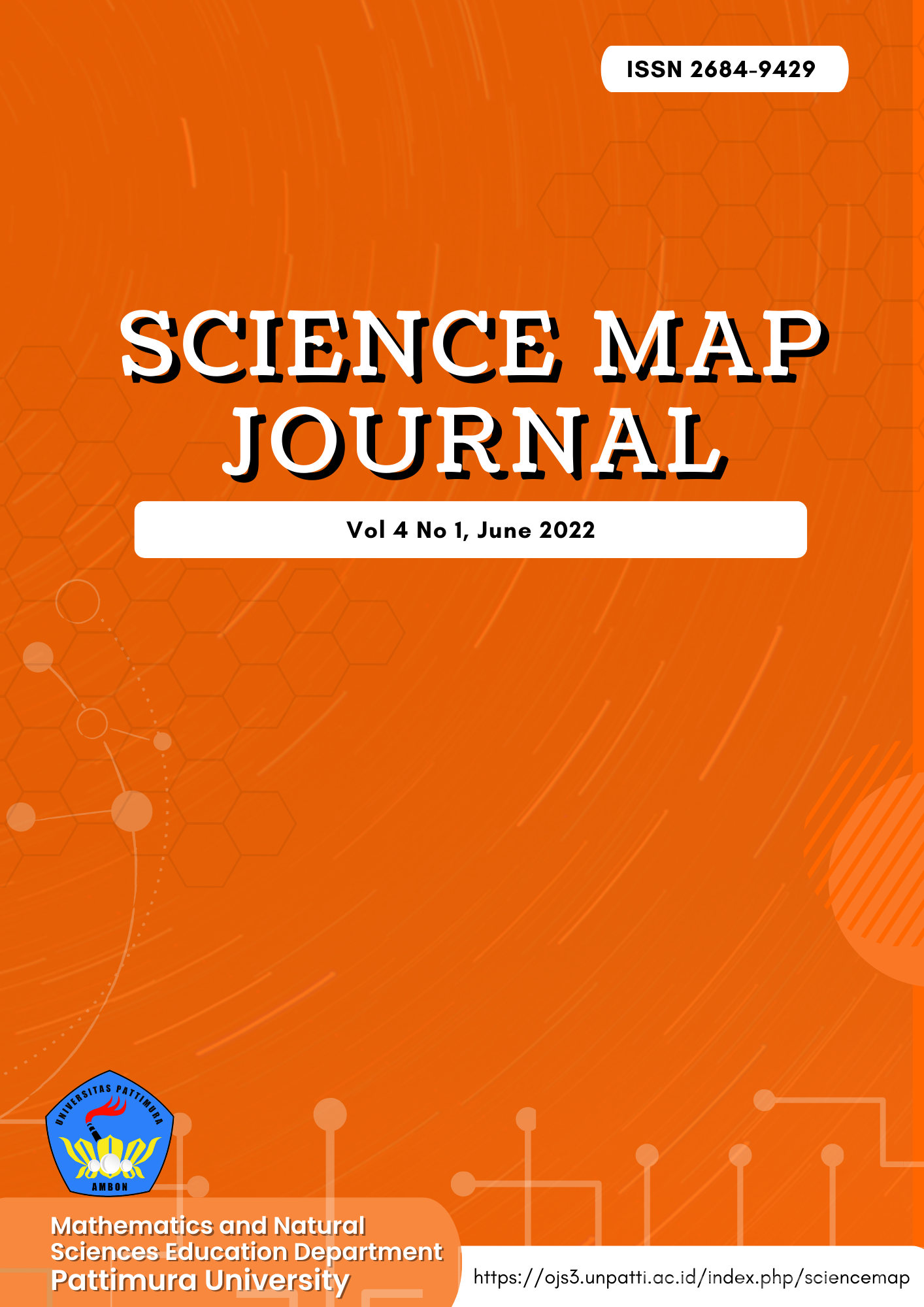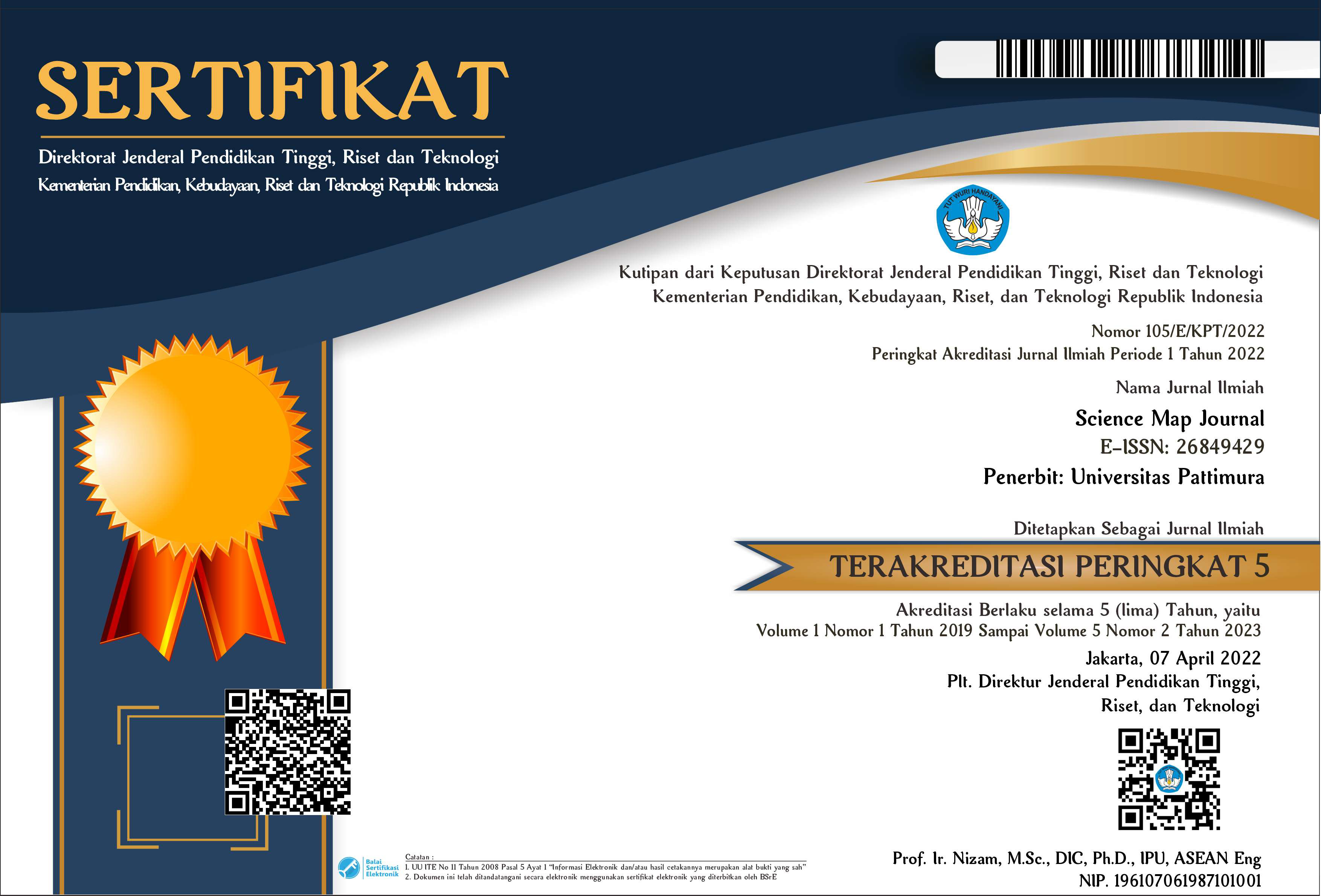ANALISIS METAKOGNISI SISWA DALAM MEMECAHKAN MASALAH MATEMATIKA DITINJAU DARI GAYA KOGNITIF REFLEKTIF DAN IMPULSIF
Abstract
This study was conducted to describe the metacognition of junior high school students in solving mathematical problems based on cognitive style. This type of research is a descriptive study using a qualitative approach which was carried out in class IX of SMP Negeri 2 Anggeraja. Results Based on the mathematical ability test and the Matching Familiar Figure Test (MFFT), 2 students were selected as research subjects. Data collection techniques were carried out by presenting problem-solving tasks and task-based interviews. Data analysis uses data reduction steps, data presentation, and drawing conclusions. The results of this study indicate that students with reflective cognitive style fulfill the three aspects of metacognition, namely planning, monitoring, and evaluating in solving problems. From the metacognitive activity of students with reflective cognitive style, it shows that the level of metacognitive ability is at the level of reflective use. Students with impulsive cognitive style fulfill the three aspects of metacognition, namely planning, monitoring, and evaluating in solving problems. However, at the planning stage only able to reveal some strategies that can be used to solve the problem and at the evaluation stage unable to prove the truth of the answers obtained. From the metacognitive activity of students with cognitive impulses, it shows that the level of metacognition ability is at the level of awareness of use
Downloads
References
Al-Silami, Tareq Abdulali. 2010. A Comparison of Creative Thinking and Reflective-Impulsive Style in Grade 10 Male Students from Rural and Urban Saudi Arabia. Master Thesis, Victoria University Melbourne, Australia.
Anggo, Mustamin. 2011. “Pelibatan Metakognisi Dalam Pemecahan Masalah Matematika.” Edumatica 01(April):25–32.
Artelt, Cordula, Sabine Weinert, and Marion Händel. 2013. “Assessing Metacognitive Knowledge: Development and Evaluation of a Test Instrument.” Journal for Educational Research Online Journal Für Bildungsforschung Online 5(2):162–88. doi: 10.25656/01.
Chairani, Zahra. 2015. “Perilaku Metakognisi Siswa Dalam Pemecahan Masalah Matematika.” Math Didactic: Jurnal Pendidikan Matematika 1(3):200–210. doi: 10.33654/math.v1i3.20.
Haghighi, Mina, Mahnaz Ghanavati, and Ali Rahimi. 2015. “The Role of Gender Differences in the Cognitive Style of Impulsivity/Reflectivity and EFL Success.” Procedia - Social and Behavioral Sciences 192:467–74. doi: 10.1016/j.sbspro.2015.06.072.
Huong Lan, Nguyen Thi. 2020. “Metacognitive Skills with Mathematical Problem - Solving of Secondary School Students in Vietnam - A Case Study.” Universal Journal of Educational Research 8(12A):7461–78. doi: 10.13189/ujer.2020.082530.
Kazemi, Farhad, Mohammad Reza Fadaee, and Sahar Bayat. 2010. “A Subtle View to Metacognitive Aspect of Mathematical Problems Solving.” Procedia - Social and Behavioral Sciences 8(5):420–26. doi: 10.1016/j.sbspro.2010.12.058.
Kenny, Robert F. 2007. “Digital Narrative as a Change Agent to Teach Reading to Media-Centric Students.” 1(11):459–67.
Kuhn, Deanna, and David Dean Jr. 2004. “Metacognition: A Bridge Between Cognitive Psychology and Educational Practice.” Theory Into Practice 43(4):268–73. doi: 10.1207/s15430421tip4304.
Mahromah, Laily Agustina, and Janet Trineke Manoy. 2013. “Identifikasi Tingkat Metakognisi Siswa Dalam Memecahkan Masalah Matematika Berdasarkan Perbedaan Skor Matematika.” MATHEdunesa: Jurnal Ilmiah Pendidikan Matematika 2(1). doi: https://doi.org/10.26740/mathedunesa.v2n1.p%25p.
Matlin, Margaret W. 2009. Cognition (7th Ed.). Hoboken, NJ: John Wiley & Sons.
Muryanti, Muryanti, Agung Handayanto, and Muhammad Prayito. 2020. “Analisis Kemampuan Metakognisi Siswa SMK Dalam Pemecahan Masalah Ditinjau Dari Gaya Kognitif Reflektif-Impulsif Dan Hasil Belajar.” Imajiner: Jurnal Matematika Dan Pendidikan Matematika 2(1):41–50. doi: 10.26877/imajiner.v2i1.5763.
Santrock, J. W. 2008. Educational Psychology. New York: Mcgraw-Hill.
Sholikha, Al’aina Mar’atus, and Muchamad Arif. 2021. “Analisis Metakognisi Siswa Dalam Memecahkan Masalah Relasi Logik Dan Fungsi Gerbang Logika Ditinjau Dari Tipe Kepribadian Tipologi Hippocrates Galenus.” Jurnal Ilmiah Edutic: Pendidikan Dan Informatika 8(1):73–80. doi: 10.21107/edutic.v8i1.12044.
Siswono, Tatag Yuli Eko, Endah Budi Rahaju, Pradnyo Wijayanti, and Sugi Hartono. 2021. “Perancangan Tugas Pemecahan Masalah Tentang Covid-19 Untuk Guru Matematika SMP.” CARADDE: Jurnal Pengabdian Kepada Masyarakat 3(Vol. 3 No. 3 (2021): April):474–80.
Suryaningtyas, Sri, and Wahyu Setyaningrum. 2020. “Analisis Kemampuan Metakognitif Siswa SMA Kelas XI Program IPA Dalam Pemecahan Masalah Matematika.” Jurnal Riset Pendidikan Matematika 7(1):74–87.
Tambunan, Hardi. 2019. “The Effectiveness of the Problem Solving Strategy and the Scientific Approach to Students’ Mathematical Capabilities in High Order Thinking Skills.” International Electronic Journal of Mathematics Education 14(2):293–302. doi: 10.29333/iejme/5715.
Taufik, A. R., and N. Zainab. 2021. “Mathematical Literacy of Students in Solving PISA-like Problems Based on Cognitive Styles of Field-Dependent and Field-Independent.” Journal of Physics: Conference Series 1918(4). doi: 10.1088/1742-6596/1918/4/042080.
Taufik, Abdul Rachman, Sadrack Luden Pagiling, Dian Mayasari, Anis Munfarikhatin, Irmawaty Natsir, and Oswaldus Dadi. 2019. “The Metacognition of Junior High School Students in Posing Mathematical Problems Viewed From Cognitive Style.” 383(Icss):137–43. doi: 10.2991/icss-19.2019.213.
Wicaksono, S. C. R., Mardiyana, and Siswanto. 2021. “Analisis Tingkat Metakognisi Siswa Dalam Pemecahan Masalah Materi Sistem Persamaan Linear Dua Variabel.” Journal UJMES 06(02):33–37.
Widadah, Soffil, Dian Septi Nur Afifah, and Suroto. 2013. “Profil Metakognisi Siswa Dalam Menyelesaikan Soal Sistem Persamaan Linear Dua Variabel Berdasarkan Gaya Kognitif.” Jurnal Pendidikan Matematika STKIP PGRI Sidoarjo 1(1):13–24.
Copyright (c) 2022 Abdul Rachman Taufik, Dessy Rizki Suryani

This work is licensed under a Creative Commons Attribution 4.0 International License.




.png)


